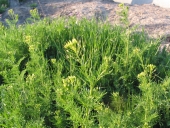
 4
4




Please give me your thoughts on my Affordable, double-paned earthbag window concept


















 2
2




Rob Lineberger wrote:Does soil impart a taste? I've foraged dandelion, red clover, mock strawberry leaves, and grown purslane, malabar spinach, and lettuce. They all have a sameness that is hard for me to describe. What's the plant version of "gamey?"
It is a privilege to live, work and play in the traditional territory of the Salish People.
Now drop and give me 52... ~ Come Join the permies Shoecamp! ~ All about Permies, including Tutorials ---
Twenty bucks off the homesteading bundle for the next 72 hours!
 2
2








Janet Reed wrote:Dirt does have flavor. As do rocks.
Please give me your thoughts on my Affordable, double-paned earthbag window concept

















 1
1




jordan barton wrote:
I imagine once these foraged foods become more common today, they will begin to be less " gamey" and become more known.
Please give me your thoughts on my Affordable, double-paned earthbag window concept


















 7
7




Rob Lineberger wrote:
Janet Reed wrote:Dirt does have flavor. As do rocks.
Can you describe the flavour?




Catie George wrote:
Clay minerals definitely have a smell.
Please give me your thoughts on my Affordable, double-paned earthbag window concept

























 4
4




 1
1




Catie George wrote:An interesting experiment might be to pick two dandelion leaves, or plant identical patches of lettuce. One in purchased potting soil or heavily ammended/mulched soil, one in native soil and see if both have the same taste to you.
Please give me your thoughts on my Affordable, double-paned earthbag window concept

















 1
1















r ranson wrote:This is a great question.
I can definitely notice a difference in the flavour of the fruit and veg if the soil isn't good at retaining moisture. Also, a difference in taste if they get a lot of sun vs mostly shade.
I'm going to start paying more attention and see what I taste.
Please give me your thoughts on my Affordable, double-paned earthbag window concept

















 6
6




Whoah!! Check out this permie deal!! https://permies.com/w/homesteading-bundle?f=232
"The only thing...more expensive than education is ignorance."~Ben Franklin. "We can easily forgive a child who is afraid of the dark; the real tragedy of life is when men are afraid of the light." ~ Plato
 7
7




 4
4




Forever creating a permaculture paradise!
 6
6




 5
5




I want to be 15 again …so I can ruin my life differently.
 2
2




John F Dean wrote:I have no doubt the the flavor of the food we grow is impacted by the medium they are grown in.
Forever creating a permaculture paradise!
 4
4






 5
5












Nothing is foolproof to a sufficiently patient fool!
I hate people who use big words just to make themselves look perspicacious.





 5
5




Blog: 5 Acres & A Dream
Books: Kikobian Books | Permies Digital Market




I am made out of Hawthorn Farm
HawthornFarm.org










 3
3




Hooray for Homesteading!
 4
4




"Do the best you can in the place where you are, and be kind." - Scott Nearing
 2
2






 2
2




 2
2




Building soil in the Yukon.
 1
1




"Where will you drive your own picket stake? Where will you choose to make your stand? Give me a threshold, a specific point at which you will finally stop running, at which you will finally fight back." (Derrick Jensen)

|
Every noble work is at first impossible --Thomas Carlyle ... noble tiny ad:
35 Ac. Homestead for Sale - Near Roanoke, VA – Asking: $995,000
https://thehopkinsgroup.biz/?page_id=501&et_fb=1&PageSpeed=off
|



